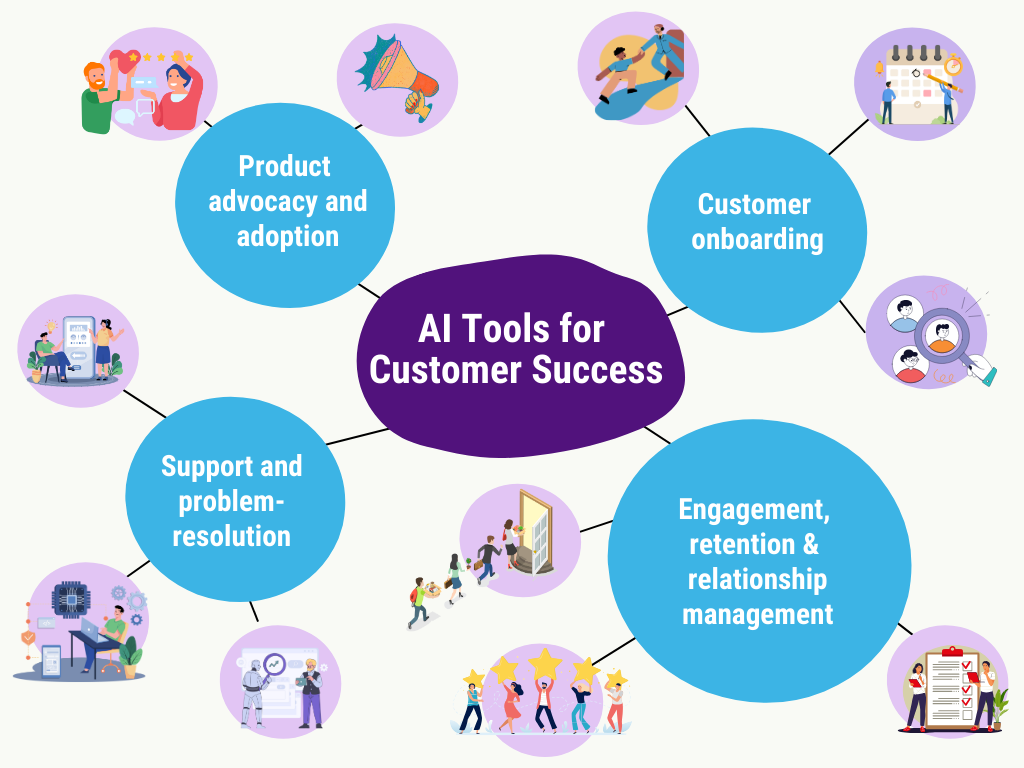With the rise of AI, customer success (CS) teams now have access to various tools that can streamline processes, provide deeper customer insights, and automate time-consuming tasks. In this blog, we’ll explore some of the best AI tools for customer success teams to help them work smarter, deliver value faster, and build stronger customer relationships.
Key takeaways
How AI tools can help customer success teams:
Automate routine tasks and support workflows – Emerging AI tools handle repetitive CS tasks—like ticket triage, chatbot responses, and email follow-ups—freeing up your team to focus on complex, high‑value customer interactions.
Enhance customer insights through data-driven analytics – AI leverages historical usage, behaviour patterns, and sentiment data to generate proactive customer health scores and identify churn risks before they escalate.
Deliver personalized, proactive onboarding and engagement – AI-powered segmentation and journey mapping enable tailored onboarding flows, proactive outreach, and individualized recommendations based on specific customer profiles and behaviour.
Scale operations while preserving a human touch – AI chatbots and digital assistants support 24/7, multilingual self‑service while alerting human agents in real time when empathy or nuanced intervention is needed.
Foster continuous learning and iteration – AI tools provide actionable suggestions for optimizing content structure, identifying learning gaps, and automatically updating training materials based on the latest product changes.
Streamline content creation for training – Platforms like LEAi can ingest your internal docs, slide decks, and product specs to auto-generate training modules, video scripts, FAQ pages, and more—enabling teams to build customer success content 3× faster.

AI for customer onboarding
AI can streamline customer onboarding by helping new customers through product setup, answering frequently asked questions, and troubleshooting common issues. AI-powered analytics can also track customer behaviour in real-time, identifying potential onboarding roadblocks and recommending personalized content or resources to enhance the learning experience. Here are some specific use cases for how AI supports customer onboarding
Personalized onboarding
AI can analyze customer data (such as industry, company size, and user behaviour) to create personalized onboarding journeys tailored to each customer’s needs. This allows companies to provide relevant information, training, and resources at the right time, ensuring a smoother and more engaging onboarding process.
Features to support this functionality may include real-time guidance and product tours within the app based on user behaviour, automated messages and notifications that include personalized onboarding content at the right moment, health scores based on user engagement and automation of routine tasks like onboarding workflows. Tools that help personalize customer onboarding: Appcues, Copy.ai, Intercom, Pendo.io, Rocketlane, WalkMe, and Userpilot.
Automated communication and support
AI-powered chatbots and virtual assistants can engage with customers 24/7, answering questions, guiding them through setup, or providing step-by-step instructions on using a product.
Features to support this functionality may include natural language processing so chatbots can understand and respond to user queries in a conversational, human-like manner, automated workflows, voice integration and escalation capabilities. Tools that support virtual assistant and chatbot functionality: Ada, Certainly, Dixa, HubSpot, Intercom, Meya, Netomi, Zendesk, Zoho SalesIQ, and Zowie.
Predictive guidance
By analyzing historical onboarding data and user behaviour, AI can predict potential bottlenecks or areas where customers might struggle.
Features to support this functionality may include customer health scoring based on factors like product usage, engagement, support interactions, and more, customer behaviour and engagement to predict the likelihood of churn, real-time alerts and recommendations when a customer reaches a critical milestone, future product usage trends based on historical data, and risk scoring. Tools that support predictive analytics capabilities: ChurnZero, Gainsight, Intercom, Pecan AI, Salesforce Einstein, and Totango.
Learning and training automation
AI can be used to provide automated, interactive tutorials or product walkthroughs that adapt to the customer’s knowledge and learning pace. This functionality is often embedded in Learning Management Systems (LMS).
Features to check out include adaptive learning paths that guide users through relevant content based on their interactions and learning pace. Another feature to consider is the ability to create branching tutorials that adjust content based on user choices, experience level, and learning objectives. Tools that support learning and training automation: Apty, Docebo, Skilljar, Spekit, WalkMe, and Whatfix.
If you want an AI tool to build learning and training, consider LEAi by LearnExperts.
” ..I have done the following with it (AI).
Described upcoming meetings and my goals. Asked the AI to draft an outline to guide the conversation.
- Input all of my meeting notes and asked AI to identify next steps and organize them.
- Downloaded recorded transcripts of calls and asked AI to summarize and create a list of any agreed upon follow-up.
- Drafted templates for customers they can share with their employees.
- Drafted letters to my customers and asked AI to edit them for clarity and conciseness.
- Asked AI to take my notes and turn them into ‘step-by-step’ instructions and how-to guides.
- Asked AI to come up with a list of questions (or topics) I can ask to accomplish a specific goal.”
AI for customer engagement, retention and relationship management
AI can significantly enhance customer success teams’ ability to manage customer engagement and relationships through automation, data-driven insights, and personalized experiences.
Predicting customer churn
AI tools can analyze customer behaviour and usage patterns to predict which customers are at risk of churning so CS teams can intervene early with personalized support or engagement strategies.
Features to check out include health scoring, behavioural analytics, AI models to forecast potential churn based on historical and real-time data and AI-driven playbooks with suggested actions, timelines, and messaging based on customer health indicators and historical responses. Tools that can help analyze customer churn: Gainsight, ChurnZero, Totango.
Personalized customer engagement
AI-powered systems can help CS teams deliver highly personalized interactions, such as customized email campaigns, relevant content, and upsell/cross-sell opportunities, based on customer behaviour, preferences, and lifecycle stage.
Potential features of interest include the ability to segment customers based on behaviour and lifecycle stage to support automated, personalized email campaigns. Also look for a content recommendation engine to suggest articles, guides, and resources relevant to the customer’s preferences and chatbots to handle common questions and provide personalized responses based on the customer’s past interactions and preferences. Tools that support personalized customer engagement: HubSpot, FreshDesk, and ActiveCampaign.
Customer surveys
AI can optimize the process of gathering customer feedback, analyzing responses, and providing actionable insights that help CS teams tailor their engagement strategies to customer preferences.
Features to consider in your surveying tool include predictive analytics to identify customers who are likely to churn or are dissatisfied based on survey responses, the ability to analyze survey responses to identify underlying sentiment, categorizing responses as positive, neutral, or negative, and the ability to dynamically adjust survey questions based on previous answers or customer profiles. Tools for customer surveys: Surveypal, Qualtrics, and Typeform.
Relationship scoring
AI can score customer relationships based on various factors, such as engagement frequency, interaction sentiment, and product usage, so CS teams can take action to improve the relationship.
Features to look into the ability to automatically update and organize contacts, categorizing them based on recent activity, engagement patterns, and connection strength to prioritize interactions, deal strength and risk scoring, and AI-generated insights to improve communication style or engagement. Tools for relationship scoring: Cloze, Gong.io, and Salesforce Einstein.
Upsell and cross-sell opportunities
AI can analyze customer behaviour and usage patterns to identify when customers might be ready for an upsell or cross-sell.
Features to explore include scoring models to identify current customers with a high likelihood of purchasing additional products or upgrades based on behaviour, personalized recommendations for upsell or cross-sell outreach and pipeline scoring. Tools for upsell and cross-sell: Infer, InsideSales, and Salesforce Einstein.
There are a few AI infusions in our CS process: 1) Automated engagement triggers for churn and upsells predicted accounts 2) Automated email responses 3) Summary & action points based on the calls and account history.
AI for support and problem-resolution
AI can be highly effective in enhancing customer success teams’ ability to resolve issues quickly, provide personalized support, and reduce the workload for human agents.
Automating routine customer interactions
AI-powered chatbots and virtual assistants can handle routine customer inquiries, helping CS teams focus on more complex or escalated issues, improving average response time and ensuring customers get consistent answers quickly.
Potential features of interest include automated responses to common customer questions, intent detection in customer messages, the ability to proactively suggest help articles or FAQs based on actions or questions, and automation of recurring tasks. Tools that support automating routine customer interactions: ZenDesk, Clearfeed.ai, Drift, Intercom.
Knowledge base enhancement
AI can continually improve and optimize self-service resources by analyzing customer questions, creating more learning resources and automatically updating knowledge base articles with more accurate or relevant information.
Features to explore include the ability to identify commonly searched terms or questions that lack sufficient knowledge base content, reviews of customer feedback to identify knowledge gaps, and automatic content creation by analyzing product documentation, support tickets, and FAQs to generate an initial knowledge base. Tools for knowledge base enhancement: Intercom, LearnExperts and Zendesk.
…We implemented AI into our support team so that whenever someone messages our support chat they use AI first and if it’s a question referenced in our how to guides then AI regurgitates that info to the customer before sending it to an actual support person. It’s helped our support team be able to deal with actual problems rather than “how do I do this thing my csm trained me to do 6mo ago”
Proactive support
AI can track customer behaviour and system usage, notifying CS teams when customers need help with a product feature or when their engagement drops.
Features to research include health scoring based on usage patterns, engagement levels, and other behavioural data, alerts for changes in health scores, recommendations for actions to take based on customer behaviours and customer engagement levels and opportunity scoring. Tools that support proactive support: ChurnZero, Salesforce Einstein and Totango.
We serve 100+ customers over Slack and Email – and use clearfeed.ai heavily. We don’t do customer-facing automated answers yet – but:
- index our public documentation and slack channels using CF.
- use it’s Agent assistant which tries to generate answers for incoming customer queries and shows them to agents only. Often we are able to reply quick to customers using these. (also helps new CS people a lot).
- also have started it’s bot functionality heavily where we can ask the CF bot to summarize the current customer discussion thread or lookup specific information.
Gotten very used to it now – would find it hard to survive without having this kind of assistant on a day-to-day basis.
AI for product adoption and advocacy
AI can play a role in personalizing customer experiences, optimizing user engagement, and encouraging customers to become advocates for the product. Here’s how AI can support these areas:
Proactive recommendations
AI can provide in-product recommendations to users on maximizing the product’s value by suggesting features they haven’t yet explored.
Features may include automated customer journey workflows that provide tailored recommendations based on user engagement and milestones, proactive alerts for changes in customer behaviour, and automated recommendation systems that suggest knowledge base articles, training, or product features based on customer interactions. Tools for proactive recommendations: ChurnZero, CleverTap, Gainsight, HubSpot Service Hub, InsightSquared, Involve.AI, Salesforce Einstein, Totango, and Zendesk Customer Experience AI.
Identifying and managing advocates
AI analyzes customer data to identify highly engaged and satisfied users, making them potential advocates or promoters of the product.
Features may include health scores highlighting highly satisfied customers and automated workflows to engage potential advocates and encourage them to share testimonials or referrals. Tool for identifying advocates: Alida, Birdeye, ChurnZero, CustomerGauge, Gainsight, HubSpot Service Hub, Influitive, InMoment, Promoter.io, Qualtrics XM, Totango and Zuberance.
Sentiment analysis
AI can assess customer sentiment in reviews, feedback, and conversations to determine which customers are the happiest and most likely to recommend the product.
Features may include real-time insights into customer emotions and satisfaction, text and voice analysis to detect positive, negative, and neutral sentiments and automated follow-up actions based on sentiment results. AI tools for sentiment analysis: ChurnZero, Gainsight, HubSpot Service Hub, InMoment, Keatext, Medallia, MonkeyLearn, Qualtrics XM, and Zendesk Customer Experience AI.
Other AI tools for customer success
Here are some other ways that AI is helping customer success teams become more productive and responsive to customer needs:
…our business runs on Slack and lately I’ve found the AI to be getting better at finding things for me and begrudgingly admit that it is finally saving me significant time.
For example, I just ask it when a product GA is, or for a dashboard that reports on X, or how I do something in our product, or how I do Y process, and the AI is actually able to find it and provide citations so I can double check it.
I can see AI assist with basic CS operations, but a good CSM is about interpersonal relations and expectation management and no customer POC wants to be turned over to an AI to coordinate on a high cost service or product, that’s just asking for churn.
LEAi – AI tool for training customer success
LEAi by LearnExperts uses AI to allow companies to rapidly create comprehensive training programs designed to skill, upskill, and reskill their teams. Powerful features in the tool include:
- Automated content conversion: Quickly transform existing Word documents, PDFs, audio and video recordings, and PowerPoint presentations into various formats, including eLearning courses, microlearning modules, video scripts, and interactive presentations.
- AI-powered content structuring: LEAi intelligently organizes and structures content, making creating cohesive and logical learning paths tailored to your team’s needs easier.
- Interactive assessments: Create quizzes, simulations, and other interactive elements that engage learners and reinforce key concepts.
- Seamless integration: LEAi integrates smoothly with your existing Learning Management System (LMS), ensuring a hassle-free implementation.
- Scalable content creation: Whether you’re developing training for a small team or an entire organization, LEAi scales with your needs, enabling rapid deployment across multiple departments.
- Translations: Translate and localize the content to meet the needs of a global audience
- Collaboration tools: Facilitate teamwork and input from multiple stakeholders with collaborative features that allow for easy content review and approval processes.
Contact us to discover how LEAi can streamline content creation by your customer success teams.




